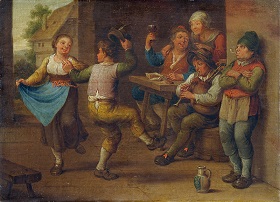This is Faith in Play #45: Special, for August 2021.
A few decades ago when I was studying Paul’s letter to Philemon I realized that the prayer, and therefore the entire book, was about how God had placed special gifts within each of us, making us uniquely suited for His place for us.

Not long ago in the companion series to this one I republished a lost Game Ideas Unlimited article under the new title RPG-ology #42: Who?, in which I suggested that a character should not know everything about himself, and so a player should not know everything about his character. This tells us that every character, every player character and every non-player character, has a special place in the world, even if they are not particularly relevant to the story. There are no unimportant people, and while our stories might be packed with inconsequential characters from innkeepers and stablehands to prime ministers and military commanders, these are people, and they are important. People matter to God, and they should matter to you.
It is not possible, of course, to fill your fictional world with millions of fully-formed characters; it would be beyond a reasonable challenge even to fill the local tavern with such people. Nor would it be useful, that is, neither your readers nor your players are going to explore the identities of every peasant in the village. Yet as impractical as it is actually to do such work, you as the creator of this world and these people need to regard them, and indeed treat them, as if that were true about them. Even I have seen video console role playing simulations in which villages contain two-dimensional people who when approached say their one or two lines, and repeat the same lines if approached again. Within the limitations of the video console’s world, that’s as fully formed as all those characters can be—but in your world, those characters should have depth. It doesn’t have to be relevant depth, that is, the blacksmith doesn’t have to know anything about the caves beyond the mountain beyond what people in the village have said, but if you ask him about the innkeeper he’s probably going to have some knowledge and an opinion, because it’s undoubtedly where he goes to relax after a hard, hot day of ironsmithing. He might not be the sort of person who talks about his neighbors, but then, he might well be glad to blab to someone willing to chat while he works or even while he drinks after work. He has a personality, and so do all the people he knows from living and working in the village.
They also have skills outside their professions. That blacksmith perhaps keeps a vegetable garden to help feed his family, and teaches his son to use a bow and arrow. The innkeeper’s wife helps with the cooking and serving, but she also does some fine knitting in the evenings while he does the washing up. The blacksmith’s wife is jealous of that ability, but then, she’s the only one in the village who can make a decent fruit pie, and the innkeeper sometimes buys these when they’re in season and serves them to his customers at a profit.
These individual skills create relationships, interconnections between the people as they support each other, each providing what others need. At the same time, not one of them sees what he does as special. Knitting, baking, shooting, gardening, these to those who do them are just ordinary abilities they happened to have learned along the way. If you asked the blacksmith what was special about him, he might (or might not) brag that he’s the finest smith in the county, but he wouldn’t mention his vegetable garden. Nor would he mention that his wife makes wonderful pies which they trade to the innkeeper for good warm knit hats and mittens, sweaters and scarves.
The main characters might not care about any of this, and it probably doesn’t matter to the plot. Yet you should be aware at least that relationships like this, built on individual abilities, are what knit the villagers together and make this a community, not just a bunch of people. Those people are special, each in his own way, and that specialness is what makes them people.
Previous article: An Alignment Grid.
Next article: Undo.
